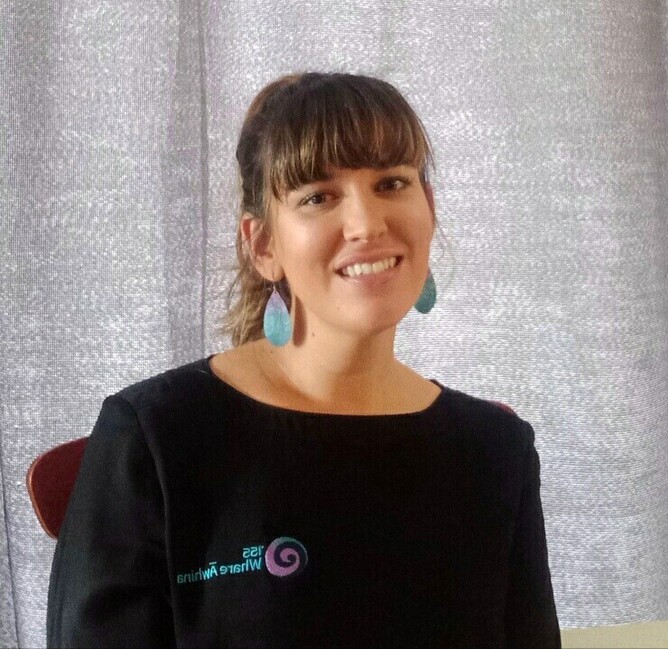Learn more about the friendly face greeting those who come through our door in Kaikohe.
What is your role with 155?
I am the coordinator of the 155 Community Law Centre in Kaikohe. My role involves a wide range of tasks, including administration work, such as making appointments for whānau, establishing and maintaining relationships with other organisations and services, and coordinating the use of our space by other service providers.
Most importantly, however, I am the first point of contact for our whānau. So I ensure everyone feels welcome at our centre; I identify whānau needs through open engagements and, where appropriate, I refer whānau to suitable 155 or external services.
Can you share three words you'd use to describe 155 Whare Awhina?
1) Whānau-centred: Because whānau needs and wellbeing are always central to 155's kaupapa.
2) Non-judgemental: Because everybody is welcomed with open arms at One Double Five.
3) Compassionate: Because the staff and volunteers at One Double Five genuinely care about the welfare of our whānau and work from the heart.
What do you enjoy most about working at 155?
Witnessing the positive outcomes for whānau resulting from our work. We have an incredible team that ceaselessly and collaboratively works towards enhancing people's wellbeing. The team goes above and beyond in their āwhina while keeping a warm and supportive work environment.
Although the positive outcomes for whānau may not always be instantly recognisable, approaching issues step-by-step and making time to engage with our whānau genuinely lays the foundations for further improvements in their lives.
Who inspires you?
I can think of a few amazing people in my life who have positively influenced me. However, my mum is definitely the most inspiring person in my life. She is an incredibly kind-hearted and strong woman who always has good advice and has motivated me to pursue my goals over the years.
Although she is on the other side of the world - in Germany - we frequently talk on the phone for hours. She keeps reminding me of my strengths and comes up with fantastic ideas when I feel stuck. I owe her a lot.
If you were the Prime Minister of New Zealand, what is the first thing you would do?
I would begin by focusing on addressing our current homelessness crisis. The issue has been ongoing despite the placement of many homeless people (especially rough sleepers) in motels since the Covid-19 outbreak.
Homelessness does not merely involve being without shelter; it also includes the many whānau who reside in unhealthy, insecure, and overcrowded places. I believe having a permanent and safe residence while not living in poverty due to exuberant housing costs is a crucial starting point for enhancing people's wellbeing and functioning.
Although it would be difficult to solve the problem instantly, particular initiatives would provide a push in the right direction. For instance, more rent-to-own projects and an increased focus on communal living, such as papakāinga-style housing around Aotearoa would serve as a great foundation.
Investing in such projects would not only support the agenda of eradicating homelessness, it would also support the endeavor of alleviating poverty in general as well as associated health and social issues.
Fun fact about yourself:
I used to be a vegetarian for more than eight years and a keen supporter of various animal rights groups. Since moving from suburban Germany to Te Tai Tokerau 11 years ago (and having access to not-factory farmed meat and seafood), I have slowly returned to being quite the carnivore. I particularly love eating steak tartare (raw beef mince), which most of my kiwi friends find disgusting.
Anything else to add?
I would like to say thank you to the staff, volunteers, and whānau at 155 and 155 Open Arms in particular, for making my master's research possible and for supporting me through my research journey.
I am about to complete my Master of Science in Psychology, for which I conducted research on the issue of homelessness in Whangārei. I approached 155 Open Arms in November 2019 about the proposed study, and the whānau, volunteers, and staff made me feel very welcome.
Meaningful relationships were central to my research, so I engaged in extensive volunteer work at the 155 Open Arms for almost one year. The insights I gained and the rapport I built are invaluable and would not have been possible without the continued support from everyone involved, including the whānau, volunteers, and staff who participated in my research.
I am so grateful for having met such amazing people and for being able to stay in touch with them through my continued mahi with 155.
Ngā mihi nui kia koutou!



